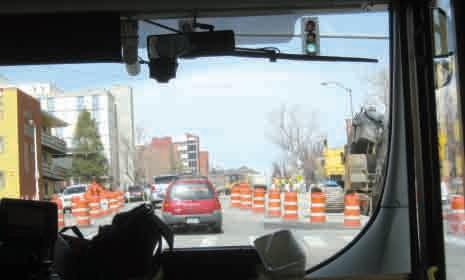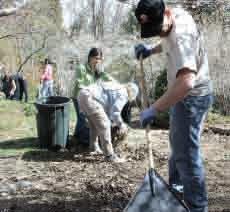
12 minute read
News
from March 15, 2012
Obama sign burned
A sign supporting the Obama/Biden ticket was burned at someone’s home by an unknown arsonist.
Advertisement
A reader comment posted on the RN&R website (see Letters, page 3) reads in part, “Tonight, March 10, at 10:10 pm someone set our ‘OBAMA/BIDEN’ sign on fire. ... I tried to catch the perpetrator, but was unable to find him. ... The sign will go back up in the morning with all of its scars. Perhaps I will catch up with the Limbaugh loving axxholes next time!!!! The sign will be up in the morning and will stay up. Police report filed.”
A Reno Police Department spokesperson confirmed the incident occurred: “We do have a report on file. Essentially, our reporting party saw flames out his front window, went out and discovered the sign had been lit on fire. He saw an unknown male riding away on a bicycle in the area. It is unknown if this individual had anything to do with the sign being lit. There is no additional information available on any possible suspects.”
The victim is Anthony Matulich, who lives on Grandview Avenue.
Fire has been a favored form of protest by some of Obama’s critics. Over the years, Obama signs have been burned in Altadena, Ca., Boca Raton, Fl., St. Peters, Mo. An effigy of the president was burned in West Allis, Wis. In Springfield, Mass., a black church under construction was torched the day after Obama’s election.
Holland announces
Former Reno mayoral candidate Erik Holland announced in a March 12 Facebook post that he will seek election to the U.S. House of Representatives.
“I’m running because I’m concerned about recent erosions of civil liberties, and want to see a return to fiscal sanity—as in paying our bills,” Democrat Holland wrote. “How odd—conservative reasons!!!”
He has been outspoken in his opposition to provisions of the 2012 National Defense Authorization Act (NDAA) that critics say allows detention of U.S. citizens who the executive branch considers terror suspects, sections that have drawn wide attention because they give wide latitude to presidential powers.
Holland was Mayor Robert Cashell’s opponent in the 2006 campaign, expressing his opposition to sprawl, particularly the Winnemucca Ranch development 30 miles from Reno proper.
The U.S. House seat is currently held by Republican Mark Amodei, who won a special election last fall for a partial term. Told that Holland would be running on NDAA and the deficit, Amodei said, “Great. He’s on the right track.”
Amodei also said there is considerable misinformation about NDAA spread by the blogosphere on what the law contains. He said there are three different provisions in the language that make clear it does not apply to U.S. citizens.
IAP nominates
Nevada’s Independent American Party nominated its 2012 candidates for public office at a convention on March 3.
David VanderBeek of Pahrump, a life skills consultant, is the U.S. Senate nominee. He ran unsuccessfully in 2010 for the Nevada Assembly.
In the northern U.S. House district, Russell Best of Stagecoach was nominated. He unsuccessfully sought election to the Stagecoach General Improvement District board in 2008. It’s his second run for the House seat. He pulled 4.05 percent of the vote in 2010 against Republican Dean Heller and Democrat Nancy Price.
The IAP was started in Nevada as the state arm of the American Independent Party, the vehicle for George Wallace’s 1968 presidential candidacy. It was kept together in most elections after that. Smaller parties do not have primary elections to nominate their candidates in Nevada, instead holding nominating conventions.
—Dennis Myers
Grinding to a halt
After four rounds of budget cuts, some services face dim future
Some Nevada programs, including aging services, are at risk of slowing down by radically or even shutting down Dennis Myers because they are being kept afloat by federal funding, and state government may not be able to pay its small share. Some of the programs involved, such as police staffing levels, cut close to the daily lives of citizens. “I will tell you that I had our staff do a matrix for me of how much [state] general fund was in every budget across the state, and there’s so little general fund money left in most places that you can’t really cut,” Assembly budget chief Debbie Smith told a Nevada Women’s Lobby luncheon last week. “Aging and Disability Services is another example. There really isn’t much general fund [money] there.” With the state providing so little money to its own programs, federal moneys or grants are keeping them going. But to qualify for those federal dollars, the state must provide matching funds. That match is normally only a fraction of the federal grants but even those small amounts are becoming more difficult to come by. “We have a great deal of federal money that funds a lot of the programs,” Smith said. “Aging is a perfect example. ... With the federal deficit reduction, all that going on, the grants to the states will probably be cut by about 30 percent. And so a lot of these justice grants, for example, that fund cops on the streets, that schools use ... foster care ... that kind of stuff is just going to be gone. Thirty percent of that money will just be gone.” She said legislators are in conversations with the Washoe County School District, which is on precarious financial footing. “They have virtually no funding— no funding—once they use up the money that we were able to free up in this [2011] legislative session. Once that’s gone, they aren’t going to have any bonding capacity ’til 2017. 2017. And that means roofs, asphalt—if anything big happens, they have to go to their [school district] general fund. ... That’s a really scary situation, but it really tells you that with our property
Assemblymember Debbie Smith of Washoe County, who oversaw construction of the state budget in the Nevada Assembly, listened to an audience member last week at a Nevada Women’s Lobby meeting.
values declining and therefore property tax revenue [also declining], that’s the ramification of that, is that the programs that we fund like that are in serious jeopardy. And there’s no ability, then, to do the repairs needed for schools other than going into general fund, which would hit the classroom. So that’s one example of the still-precarious position we find ourselves in.”
Acouple of her listeners asked Smith about cultural programs such as libraries, and she had to tell them that with budget levels now so low, choices have become much more painful (“Artburn,” RN&R, Dec. 30, 2010).
“When you’re talking about human life versus anything else, it’s always hard to preserve,” she said. “It’s hard to preserve culture and parks and that type of budget item because you’re looking at taking older people off of day care. ... There were hearings that I personally as the chairman had a hard time getting through because I knew what we were facing. You know, cutting the senior property tax assistances program, cutting veteran’s services officers.” She said legislators had made some progress in rebuilding mental health programs after previous economic downturns and now find themselves returning those programs to reduced levels again. With four waves of budget cutting behind the state, the easy cuts were already made two or three rounds ago. One of those is state workers and their benefits, which have been slashed more than once, to the point that some state workers are now eligible for public assistance and workers are departing state service. That kind of turnover causes expensive and perpetual training costs. Moreover, the desirability of state employment is not what it once was. “The state employees have continually taken cuts in the form of furloughs,” Smith said. “The last session we did a combination of furloughs and pay cuts. They had their benefits cut and their costs increased. Because they are such a large part of the budget they are a natural target, if you will, for cuts. But it’s hard. Doing it once is one thing, but over and over is very difficult. We have state employees who qualify for state aid”—a murmur ran through the audience—“and that’s very, very difficult for us to know.”
State workers leaving for the private sector or leaving the state now number in the thousands, she said.
Harder to ignore
State legislators and executive officials have worked hard to insulate the public from the effects of budget cuts, but that is becoming more difficult to do. “This is where the rubber meets the road, that the cuts
that we’ve made are starting to take effect, and people are starting to notice,” Smith said.
Smith said that as chair of the committee that builds the state budget, she was often exasperated by the shortsightedness of some decisions she had to preside over.
“I said a couple of times during budget hearings it was reminding me of my mother’s old saying about tripping over a dollar to pick up a dime, that at so many budget hearings that’s what it felt like, that we were cuttings something that we knew, down the road, was going to cost us more.” (Italics reflect the emphasis in Smith’s voice.)
She also noted that at meetings of the Interim Finance Committee— a panel that handles legislative money matters when the full legislature is out of session—some lawmakers who, at the 2011 Nevada Legislature, opposed restoring any programs, are now taken aback by the dwindling services.
“And I’ll tell you that every single Interim Finance Committee meeting, there’s tons of discussion of ‘Oh, my gosh.’And I think, ‘Well, people, what did you think was going to happen?’ When you cut millions of dollars out of the child care subsidy program ... people are going to lose their child care subsidies and then they are not going be able to go to work.”
Smith described a couple of bright spots, if they can be called that. In answer to a question about state parks, she said because Nevada has never created much of a state park system, it was relatively easy to protect it from funding cuts.
And she said lawmakers in 2011 made things a little easier for themselves at the 2013 Legislature by reducing some of the bookkeeping tricks they had used since the beginning of the recession to patch budgets together.
“Fortunately, we did solve the budget problems with fewer of the sort of smoke-and-mirror things that had happened in the past, where all were doing was moving money from one place to another, but we would have to deal with it down the road,” Smith said. “We eliminated a lot of those in the budget that we finally passed. So at least we don’t have those things to deal with going into the next session.”
One of those arrangements was stopped only by a timely Nevada Supreme Court ruling. On May 26, 2011, Smith was presiding over a hearing on Gov. Brian Sandoval’s proposal to take school district construction bond money for state use when an aide handed her a note saying the court had just handed down a decision curbing the Legislature’s ability to take money away from local governments in order to fund state programs. Ω
“Remember that we’ve cut the budget four times.”
Assemblymember Debbie Smith Assembly budget chief
Virginia reel
A Sierra Spirit bus navigated North Virginia Street behind a line of cars. Road construction has created havoc for cars and other vehicles. Some streets are closed. There is construction—or the trappings of it—between Fourth and Fifth streets, between Fifth and Sixth, between Sixth and Seventh, and between Maple and Artemesia. Several bus stops are shut down, and one is open but blocked by construction signs and plastic pylons.




www.newsreview.com Forget the ‘deal of the day’! Visit
Greenest little city
Students at the Davidson Academy are taking their recycling efforts (“Go-getter,” Jan. 26) to the next level with a petition started on Change.org to “Require Recycling in Reno Apartments.” The petition states, “We are dumping all our recyclable materials into a landfill that supports the waste of[more than] 200,000 residents [residing in apartments]! With required recycling written into the Reno Franchise Agreement for single family homes, apartment residents all across our city should have the same access torecycling bins with no impact on their lease. “Both Carson City and Las Vegas have at least minimal access to recycling for apartments.Why doesn’t Reno?We need to start caring about recycling in our community.This is only the first step to making Reno theGreenest Little City in the World!” View the petition at http://tinyurl.com/7fhv2nj. —Ashley Hennefer
ashleyh@newsreview.com
Low battery
The Volt electric car is showing signs of faltering. General Motors will halt the manufacture of Volts from March 19 until April 23 after sales goals were not met. Sales of the Volt have grown steadily, but never to the level GM wanted. Last year 7,671 Volts were sold, short of the corporation’s 10,000 target. Sales in January and February are lower than needed to meet the 2012 target of 45,000 and the company is building an unsold inventory. After a federal rebate, the Volt sells for $33,500.
The GM announcement of the temporary halt to manufacture of the car came just three days after President Obama told a United Auto Workers conference, “And five years from now, when I’m not president any more, I’ll buy one and drive it myself.” The audience cheered wildly, and it’s uncertain whether the cheers were for Obama’s support for their car or for the implication that he will be in office for another term.
Washington Post editorial writer Charles Lane wrote of the GM announcement that “progressives’ fascination with electric cars and other alternative-energy schemes reflects their own refusal to face the practical limitations of alternative energy—limitations that themselves reflect stubborn scientific facts.”
—Dennis Myers
ECO-EVENT
Rail City Garden Center and News Talk 780 KKOH will host the volunteer Spring Cleanup Day at Washoe County’s Wilbur D. May Arboretum. Workshops on rose care and tree pruning start at 9 a.m. Bring hand pruners, loppers and a small folding hand saw. Refreshments and snacks will be provided. March 31, 9 a.m.-noon. To volunteer, call Denise Evans at 823-6525.
Got an eco-event? Contact ashleyh@newsreview.com. Visit facebook.com/RNRGreen for more.











